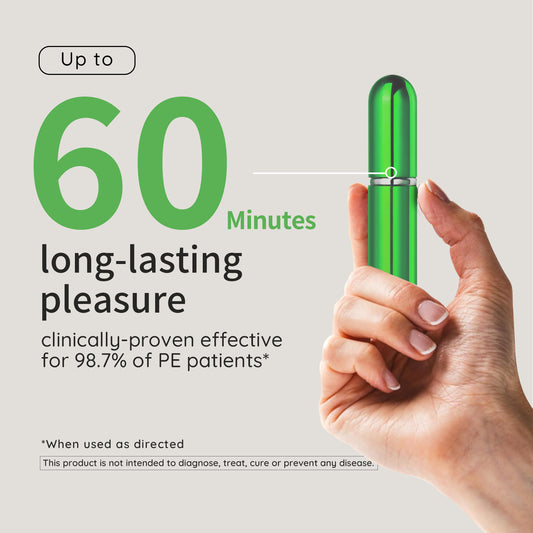Introduction
When a man ejaculates, sperm enters the vagina and embarks on an intricate journey through the female reproductive tract. But how does it feel when a man ejaculates inside you? For many people, the sensation may vary, but it’s often described as a feeling of warmth or fullness, which is a direct result of the semen being deposited inside the vagina. While this may seem like the end of the process, it's only the beginning. Sperm can live for up to five days inside the female body, increasing the chances of pregnancy even if intercourse doesn't immediately coincide with ovulation.
Understanding what happens next can help demystify the journey from ejaculation to conception, and it can also shed light on important factors that influence the likelihood of pregnancy. From the female reproductive tract to the chances of getting pregnant, this article will guide you through each stage.

For a deeper dive into how sperm interacts with the reproductive system, check out our blog post on How Sperm Reaches the Egg.
What Happens After Ejaculation?
- Once man ejaculates, his sperm begins its journey inside the woman's body. The semen, which contains millions of sperm cells, is deposited into the vagina, and from there, sperm must travel through the cervix and into the uterus to reach the fallopian tubes. If sperm enters the body near the time of ovulation, it increases the chances of pregnancy.
- But how to confirm whether sperm went inside? There are a few signs that may suggest sperm has been ejaculated inside the vagina. You might experience a sensation of warmth or fullness, or you might notice the presence of semen after intercourse. It’s important to note that even if you don’t feel anything, sperm could still have been deposited and may be moving toward the egg.
- Studies have found that sperm can survive up to five days inside the female body, which can influence the chances of conception even if intercourse doesn't coincide with ovulation (Healthline).
The Female Reproductive Tract: Key Areas for Conception
The journey of sperm through the female reproductive tract is crucial to conception. After ejaculation, sperm swims through the cervix, enters the uterus, and travels up to the fallopian tubes, where fertilization can occur if an egg is present. However, it’s important to understand the female reproductive tract's role, as this pathway affects how easily sperm can reach the egg.
The chances of pregnancy are highest when sperm reaches the fallopian tube during ovulation, when an egg is ready for fertilization. The environment inside the reproductive tract is highly specialized to help sperm survive long enough to meet the egg.
Understanding how the female reproductive tract functions is crucial. You can explore related information in our EjaGuard Blog.

Understanding the Menstrual Cycle and Its Role in Pregnancy
The menstrual cycle plays a significant role in determining the chances of getting pregnant. It’s important to note that conception is most likely to occur around ovulation, the period when an egg is released from the ovaries. This typically happens about 14 days before the start of the next period in a standard 28-day cycle.
Knowing when you are ovulating can help you determine your chances of getting pregnant. For instance, if sperm enters the vagina during ovulation, the likelihood of pregnancy increases because the sperm can potentially fertilize the egg. Knowing when you ovulate is vital for conception. Tools like ovulation predictor kits can help track this (Mayo Clinic).
When Sperm Enters Your Body: What Happens Next?
- So, what happens after sperm enters your body? The moment sperm enters the vagina, it begins a race to find the egg. As sperm swim through the cervix and uterus, they are aided by the cervical mucus, which becomes more slippery during ovulation. This helps the sperm survive and move toward the fallopian tubes where an egg may be waiting.
- But how does it feel when someone cums in your ass or the vagina? While sensations differ from person to person, most people describe the feeling as one of warmth or pressure when sperm is deposited. It’s important to remember, though, that conception occurs only when sperm successfully reaches the egg and fertilizes it, which is influenced by factors like sperm health, the timing of ovulation, and the overall fertility of both partners.
- For those who are exploring options for enhancing sexual pleasure or intimacy, our Lubricants can improve comfort and support during this crucial stage.

Preventing Pregnancy: Methods and Effectiveness
If you're not trying to get pregnant, preventing conception is crucial. There are a variety of methods available for preventing pregnancy, including hormonal methods like birth control pills, intrauterine devices (IUDs), and barrier methods such as condoms. These methods help reduce the chance of sperm entering the vagina and meeting the egg, thus decreasing the chances of getting pregnant.
It’s essential to use protection during intercourse if you're trying to avoid pregnancy. Even though methods like withdrawal or tracking fertility can reduce the chance of sperm fertilizing the egg, they are not 100% effective, so using birth control is often the safest option.
Barrier methods like condoms are proven to be effective at preventing pregnancy and reducing the risk of STIs (Planned Parenthood).
Early Signs and Symptoms of Pregnancy
- Once sperm successfully fertilizes the egg, pregnancy begins. This can lead to early pregnancy symptoms like a missed period, nausea (often referred to as morning sickness), fatigue, and tender breasts. These symptoms can vary from person to person and may not appear immediately after conception.
- Important to note is that these signs are not always definitive. A missed period and morning sickness may signal pregnancy, but the best way to confirm is by taking a pregnancy test. The test will detect the hormone HCG, which is produced once the fertilized egg implants in the uterus.
Oral Sex and Pregnancy: Can It Lead to Conception?
Many people wonder if oral sex can lead to pregnancy. The answer is no, because sperm would not be able to reach the reproductive organs from the mouth. However, if sperm comes into contact with the vagina through other means, there is still a chance of pregnancy. For example, if semen is accidentally transferred from the mouth to the vaginal area, it could increase the chance of sperm fertilizing an egg.
It’s important to understand these nuances when considering pregnancy risks and prevention. Oral sex does not lead to pregnancy, but it's still important to practice safe sex to avoid STIs. Learn more from CDC's Sexual Health Resources.

Conclusion: Factors to Consider for Pregnancy and Prevention
Conception and pregnancy are influenced by many factors. From the moment sperm enters your body, it embarks on a journey through the female reproductive tract, possibly leading to pregnancy. Understanding your menstrual cycle, using contraception effectively, and recognizing pregnancy symptoms are key to navigating conception and prevention.
Whether you're looking to conceive or avoid pregnancy, understanding your reproductive health is key. EjaGuard offers a variety of products to support your needs.
 Buy Now
Buy Now



